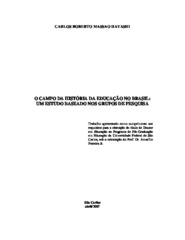| dc.contributor.author | Hayashi, Carlos Roberto Massao | |
| dc.date.accessioned | 2016-06-02T19:35:34Z | |
| dc.date.available | 2009-09-08 | |
| dc.date.available | 2016-06-02T19:35:34Z | |
| dc.date.issued | 2007-04-24 | |
| dc.identifier.citation | HAYASHI, Carlos Roberto Massao. The field of History of Education in Brazil: a study based on the research groups. 2007. 249 f. Tese (Doutorado em Ciências Humanas) - Universidade Federal de São Carlos, São Carlos, 2007. | por |
| dc.identifier.uri | https://repositorio.ufscar.br/handle/ufscar/2214 | |
| dc.description.abstract | This study is about the field of the History of Education in Brazil and it was based on the analysis of the research groups that integrate the Directory of Research Groups in Brazil/CNPq, in order to verify its contribution for the consolidation of this research area in the country. The criterion for the recognition of group integrant of the critical
mass in History of the Education was the development, at least, of a research line in this area, as defined for the group leader. The methodology was developed in the following
stages: 1) literature review on the research in education in Brazil with focus on the History of the Education; 2) data retrieval in the Directory of Research Groups in Brazil/CNPq for identification of the research groups and in the Lattes Platform Résumé for recovery of the scientific production of the research groups leaders; 3) description and categorization of the retrieved data and 4) analysis and interpretation of the results achieved through the bibliometrical approach. For the development of the methodology, a software of bibliometrical analysis was used, and that had as objective to identify the characteristics of the research groups of the area of Education, consisting of the following aspects: a) area of knowledge; b) year of creation; b) leadership; c) research lines; d) composition (researchers, students and technicians); e) repercussions of the group activities; f) scientific and technological production; g) region; h) institutional entailing; i) scientific collaboration. The results achieved in the censused base 2004 of the Directory of Research Groups/CNPq had identified the existence of 108 groups and 317 research lines. The analyses allowed to delineate the scientific activities of the research groups in History of the Education, its geographic and institutional distribution, the subjects of research, the standards of the spreading of results of the researches and
the social relevance of the realized researches. The retrieved data were collated with the theoretical review objectifying to guarantee validity and fidelity in its interpretation. | eng |
| dc.format | application/pdf | por |
| dc.language | por | por |
| dc.publisher | Universidade Federal de São Carlos | por |
| dc.rights | Acesso Aberto | por |
| dc.subject | Educação | por |
| dc.subject | História da educação | por |
| dc.subject | Análise bibliométrica | por |
| dc.subject | Produção científica | por |
| dc.subject | Education | eng |
| dc.subject | History of education | eng |
| dc.subject | Bibliometric analysis | eng |
| dc.subject | Scientific production | eng |
| dc.title | O campo da História da Educação no Brasil: um estudo baseado nos grupos de pesquisa | por |
| dc.title.alternative | The field of History of Education in Brazil: a study based on the research groups | eng |
| dc.type | Tese | por |
| dc.contributor.advisor1 | Ferreira Junior, Amarilio | |
| dc.contributor.advisor1Lattes | http://lattes.cnpq.br/0748545841167046 | por |
| dc.description.resumo | O estudo realizado refere-se ao campo da História da Educação no Brasil e foi baseado na análise dos grupos de pesquisa que integram o Diretório de Grupos de Pesquisa no
Brasil/CNPq, visando verificar a sua contribuição para a consolidação dessa área de pesquisa no país. O critério para o reconhecimento de grupo integrante da massa crítica em História da Educação foi o desenvolvimento, pelo menos, de uma linha de pesquisa nessa área, conforme definido pelo líder do grupo. A metodologia utilizada foi desenvolvida nas seguintes etapas: 1) revisão de literatura sobre a pesquisa em educação no Brasil com foco na História da Educação; 2) coleta de dados no Diretório de Grupos de Pesquisa no Brasil/CNPq para identificação dos grupos de pesquisa e na Plataforma de Currículo Lattes para recuperação da produção científica dos líderes dos grupos de pesquisa; 3) descrição e categorização dos dados obtidos e 4) análise e interpretação dos resultados obtidos realizadas à luz da abordagem bibliométrica. Para o desenvolvimento da metodologia foi utilizado software de análise bibliométrica que teve por objetivo identificar as características dos grupos de pesquisa da área de Educação, com relação aos seguintes aspectos: a) área de conhecimento; b) ano de criação; b) liderança; c)
linhas de pesquisa; d) composição (pesquisadores, estudantes e técnicos); e) repercussões das atividades do grupo; f) produção científica e tecnológica; g) região; h) vinculação institucional; i) colaboração científica. Os resultados obtidos na base censitária 2004 do Diretório de Grupos de Pesquisa/CNPq identificaram a existência de 108 grupos e 317 linhas de pesquisa. As análises realizadas permitiram delinear as atividades científicas realizadas pelos grupos de pesquisa em História da Educação, sua distribuição geográfica e institucional, os temas de pesquisa, os padrões de divulgação
de resultados das pesquisas e a relevância social das pesquisas realizadas. Os dados obtidos foram confrontados com o referencial teórico objetivando-se garantir validade e
fidelidade na sua interpretação. | por |
| dc.publisher.country | BR | por |
| dc.publisher.initials | UFSCar | por |
| dc.publisher.program | Programa de Pós-Graduação em Educação - PPGE | por |
| dc.subject.cnpq | CIENCIAS HUMANAS::EDUCACAO | por |
| dc.contributor.authorlattes | http://lattes.cnpq.br/9136586124586219 | por |
